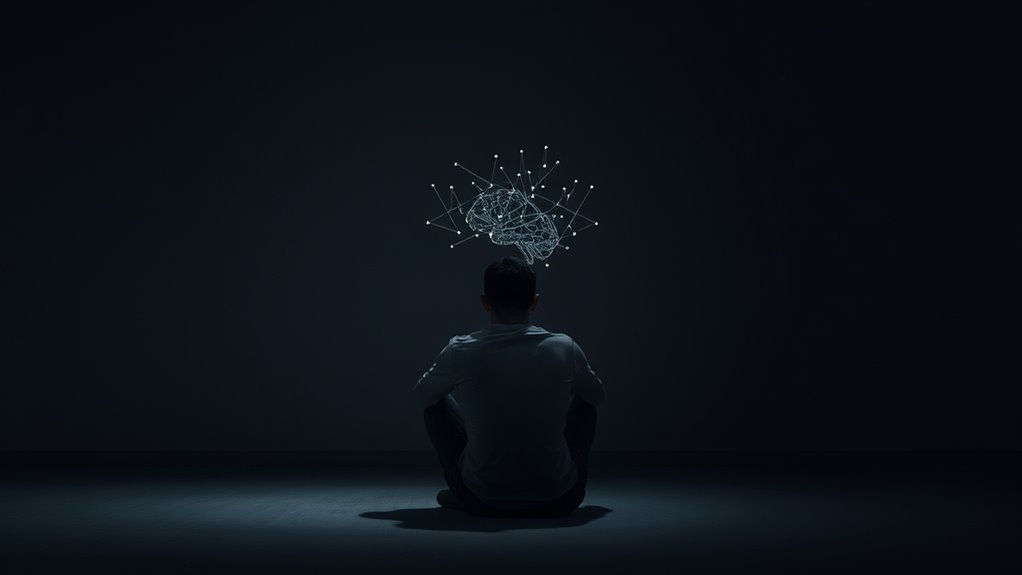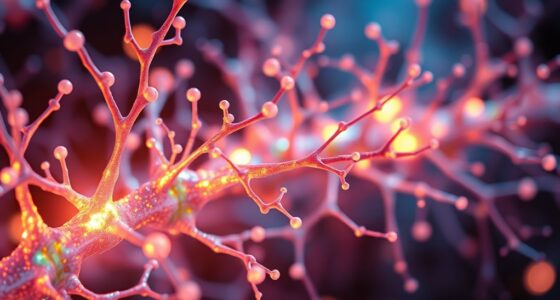Social isolation causes significant physiological changes in your brain, disrupting neural structures involved in emotions, social cognition, and memory. It weakens pathways controlling empathy and trust, leads to reduced neuroplasticity, and hampers learning. Elevated stress hormones like cortisol damage neurons and impair brain resilience. Over time, social disconnection accelerates brain aging and lowers neurotransmitter levels, affecting mood and motivation. To understand how these changes develop and how to counteract them, explore what happens beneath the surface of loneliness.
Key Takeaways
- Social isolation causes structural brain changes, impairing emotional regulation, social memory, and neural circuits involved in social cognition.
- It reduces neurogenesis and neural plasticity, weakening learning, memory, and overall brain adaptability.
- Elevated stress hormones like cortisol from loneliness damage hippocampal neurons, affecting memory and cognitive function.
- Prolonged social disconnection accelerates brain aging, leading to hippocampal shrinkage and slowed processing speed.
- Decreased neurotransmitter activity (serotonin, dopamine) from social withdrawal impacts mood, motivation, and emotional health.
The Impact of Loneliness on Brain Structure

When you experience prolonged loneliness, it can lead to measurable changes in your brain’s structure. Your brain adapts to social disconnection by altering areas involved in emotional regulation, making it harder to manage feelings like anxiety or sadness. It also impacts social memory, which helps you recognize and remember other people. Over time, these changes can weaken neural connections, reducing your ability to interpret social cues and respond appropriately. These structural shifts aren’t just psychological—they’re physical, affecting how your brain processes social information and regulates emotions. Recognizing this connection emphasizes the importance of maintaining social connections to preserve your brain’s health and resilience. Additionally, brain plasticity can influence how adaptable these structural changes are over time, highlighting the potential for recovery through social engagement. Engaging in regular social activities can promote neuroplasticity, aiding in the reversal or mitigation of these structural effects.
Neural Pathways Affected by Social Disconnection

Social disconnection directly impacts the neural pathways that facilitate social cognition and emotional regulation. When you’re isolated, the brain’s social circuits weaken, making it harder to interpret social cues and respond appropriately. The neural pathways involved in empathy, trust, and emotional processing become less active, impairing your ability to connect with others. This disruption affects areas like the prefrontal cortex and amygdala, which coordinate emotional responses and social understanding. Over time, reduced stimulation of these pathways can lead to decreased neural plasticity, further impairing social functioning. This decline in neural plasticity can make it even more difficult to regain social skills after periods of isolation. Essentially, social disconnection dulls the neural circuits that support healthy social interactions, reinforcing feelings of loneliness and making social engagement more challenging. This cycle underscores the profound impact of social isolation on brain health.
Stress Response and Its Role in Brain Health

The body’s stress response plays a crucial role in maintaining brain health, especially during challenging situations. When you face social isolation, your body activates hormonal regulation to manage stress. This response influences your immune response, helping your body adapt or recover. If stress persists, it can impair neural functioning and weaken defenses. The table below highlights key aspects:
| Aspect | Impact on Brain Health |
|---|---|
| Cortisol Release | Excess can damage neurons |
| Hormonal Regulation | Maintains balance during stress |
| Immune Response | Modulated by stress, affects inflammation |
| Chronic Stress | Diminishes neuroplasticity |
| Recovery Mechanisms | Restore neural integrity |
Additionally, hormonal regulation plays a vital part in balancing physiological responses and preventing overload that could harm brain structures. Proper stress management techniques can help mitigate these effects and support brain resilience. Understanding this interplay helps you recognize how social isolation may disrupt these processes, affecting overall brain health. Extended hours at some banking branches can be helpful for scheduling appointments or managing transactions during busy or inconvenient times.
Brain Aging Accelerated by Social Isolation

Prolonged social isolation can substantially speed up the natural aging process of your brain. When you’re isolated, your emotional well being suffers, leading to increased vulnerability to cognitive decline. This isolation hampers your social skill development, making it harder to connect with others over time. As a result, your brain’s structure and function deteriorate faster than normal. To understand this better:
- You experience reduced neuroplasticity, impairing your ability to learn and adapt.
- Your hippocampus shrinks, affecting memory and spatial navigation.
- Your brain’s white matter slows down, impacting processing speed.
- Embracing Stoic wisdom can help build resilience against these negative effects by fostering emotional strength and mental clarity. Additionally, emotional resilience plays a crucial role in maintaining mental health during periods of isolation. Recognizing the importance of brain health can motivate efforts to stay socially engaged and mentally active, which may slow these detrimental changes.
These changes accelerate brain aging, increasing risks for neurodegenerative diseases. Maintaining social connections and supporting emotional well being are *vital* to slow this process and promote healthier brain aging.
Changes in Neurotransmitter Activity Due to Social Withdrawal

When you withdraw from social interactions, it triggers significant changes in your brain’s neurotransmitter activity. Social withdrawal often leads to a neurotransmitter imbalance, disrupting mood regulation. Reduced social contact decreases serotonin and dopamine levels, which are essential for feeling happy and motivated. This imbalance can cause feelings of loneliness, depression, and anxiety. The table below highlights key neurotransmitters affected by social withdrawal:
| Neurotransmitter | Effect of Social Withdrawal | Impact on Mood Regulation |
|---|---|---|
| Serotonin | Decreases | Causes mood dips |
| Dopamine | Decreases | Reduces motivation |
| GABA | Alters | Increases anxiety |
| Norepinephrine | Fluctuates | Affects stress response |
| Endorphins | Lower | Diminishes pleasure |
Understanding these changes emphasizes how social isolation directly influences your brain chemistry. Additionally, neurotransmitter imbalance can exacerbate the negative effects of social withdrawal on mental health.
The Relationship Between Social Interaction and Cognitive Function

Social interaction plays an essential role in maintaining and enhancing your cognitive functions. When you engage with others, you strengthen social bonding, which boosts your brain’s ability to process information and solve problems. Regular social engagement builds cognitive resilience, helping your brain adapt to challenges and reduce decline over time. To understand this better, consider:
Engaging socially enhances brain health, boosts resilience, and sharpens problem-solving skills over time.
- Social bonding releases neurochemicals that support neuron health and connectivity.
- Active social lives promote mental agility, improving memory and attention.
- Strong social ties decrease stress, which protects your brain from damage.
- Engaging in social activities encourages brain stimulation, which is vital for maintaining cognitive health. Additionally, participating in social activities may involve the use of essential oils, which can have calming and immune-boosting effects that support overall brain function. Incorporating social connection strategies can further enhance these benefits by promoting deeper emotional support and resilience.
Physiological Effects of Isolation on Brain Plasticity

When you’re socially isolated, your brain’s ability to form new connections can decrease, impacting learning and memory. Isolation also suppresses neurogenesis, limiting the growth of new neurons critical for brain flexibility. Additionally, increased stress hormones from loneliness further hinder brain plasticity and recovery. Engaging in stimulating activities like crochet techniques can serve as a therapeutic activity to stimulate brain function and promote mental well-being. Regular mental exercises and brain training can help mitigate some of these negative effects and support cognitive resilience.
Synaptic Connectivity Changes
Isolation can profoundly alter synaptic connectivity in the brain, disrupting the delicate balance of neural communication. These connectivity alterations impact synaptic plasticity, reducing the brain’s ability to adapt and learn. As a result, your neural circuits may weaken or reorganize in ways that impair cognitive functions. Here are three key ways isolation affects synaptic connectivity:
- Decreased synaptic strength, weakening communication between neurons. Synaptic strength depends on the efficacy of neurotransmitter release and receptor sensitivity, which can be compromised during periods of social deprivation.
- Reduced formation of new synapses, limiting plasticity. This hampers the brain’s ability to adapt to new experiences and can lead to long-term developmental deficits.
- Altered receptor function, impairing synaptic signaling efficiency. Changes in receptor responsiveness can diminish neural responsiveness to stimuli, affecting learning and emotional regulation.
These changes hinder your brain’s capacity to rewire itself in response to experiences, which can contribute to emotional and cognitive difficulties. Understanding these connectivity alterations highlights the importance of social interaction for maintaining healthy synaptic plasticity and overall brain health. Fathers often serve as role models, emphasizing the significance of supportive relationships in brain development.
Neurogenesis Suppression Effects
Prolonged periods of social deprivation can markedly suppress neurogenesis, the process by which new neurons form in the brain’s hippocampus. This neurogenesis suppression hampers your brain’s ability to regenerate cells, reducing plasticity and impairing learning and memory. Isolation limits stimuli that promote brain regeneration, leading to fewer new neurons and weaker neural networks. Additionally, such deprivation can negatively affect overall biodiversity within the brain’s neural networks, impacting various cognitive functions. As noted in the Law of Attraction principles, maintaining vibrational energy and positive stimuli can support brain health and resilience during challenging times. Recent advancements in neural network integration suggest that stimulating environments are crucial for supporting neurogenesis and overall brain health.
Stress Hormone Impact
Social deprivation triggers a physiological response that considerably influences brain plasticity through the release of stress hormones. Elevated levels of cortisol and adrenaline from stress modulation can impair neural connections and hinder recovery. As you experience social isolation, your hormone regulation shifts, leading to increased stress hormone production. This impacts brain regions responsible for memory and emotional regulation. To understand this better, consider these points:
- Chronic stress elevates cortisol, damaging hippocampal neurons.
- Disrupted hormone regulation reduces neuroplasticity and learning capacity.
- Persistent stress hampers the brain’s ability to adapt, prolonging negative effects of social isolation.
Strategies to Mitigate Brain Changes Caused by Social Isolation

Implementing targeted strategies can substantially reduce the negative brain changes associated with social isolation. Building strong social support networks helps buffer the effects of loneliness and promotes brain health. Reach out to friends, family, or support groups to foster meaningful connections. Additionally, engaging in community activities offers regular social interaction and a sense of belonging. Volunteering or participating in local events keeps your mind active and connected to others. Regular physical activity and mental exercises, like puzzles or learning new skills, also support brain resilience. Prioritizing social support and community engagement can counteract isolation’s harmful effects, helping maintain cognitive function and emotional well-being. These strategies empower you to actively protect your brain against social isolation’s physiological impact.
Frequently Asked Questions
Can Social Isolation Lead to Permanent Brain Damage?
Social isolation can impact your brain, but it doesn’t necessarily cause permanent damage. Your neuroplasticity potential allows your brain to adapt and recover over time, especially if you foster emotional resilience. While prolonged isolation might lead to cognitive or emotional challenges, engaging in social activities and mental exercises can help restore your brain’s health. So, with effort, you can mitigate lasting effects and support your brain’s resilience.
How Quickly Do Brain Changes Occur From Social Disconnection?
You might wonder how fast brain changes happen from social disconnection. In reality, your brain’s neuroplasticity allows rapid adaptation, sometimes within days, affecting emotional resilience. While social isolation can weaken neural pathways, the brain is also capable of quick recovery with social engagement. So, the sooner you reconnect, the better your chances to reverse negative effects, emphasizing how resilient your brain can be despite initial setbacks.
Are Some Individuals More Vulnerable to Social Isolation Effects?
Some individuals are more vulnerable to social isolation effects due to factors like genetic predispositions and personality traits. If you have a family history of mental health issues or tend to be more introverted or anxious, you’re at higher risk. Your unique biology and personality can influence how social disconnection impacts you, making it essential to seek social engagement and support to protect your mental and physical health.
What Role Do Genetics Play in Social Isolation’s Impact on the Brain?
You should consider that genetics influence how social isolation impacts your brain through genetic predispositions. Your genes interact with the environment, meaning gene-environment interactions can either amplify or mitigate negative effects. If you have certain genetic traits, you might be more vulnerable or resilient to social isolation’s impact. Understanding these genetic factors helps explain individual differences and can guide personalized strategies to protect your mental health.
Can Social Recovery Reverse Brain Alterations Caused by Isolation?
You wonder if social recovery can reverse brain alterations caused by isolation. The good news is that neuroplasticity recovery shows your brain’s ability to adapt and heal through social intervention. Engaging in meaningful social activities can stimulate neural connections, promoting recovery. While some changes may be long-lasting, consistent social interaction and targeted interventions boost your chances of reversing negative effects, supporting overall mental and emotional well-being.
Conclusion
If you feel socially isolated, remember that loneliness can shrink your brain’s gray matter by up to 7%, impacting memory and decision-making. Staying connected boosts neuroplasticity and reduces stress, protecting your brain from accelerated aging. Engaging with others regularly isn’t just good for your mood—it keeps your brain healthy and resilient. So, make social interactions a priority; your brain’s future depends on it.









